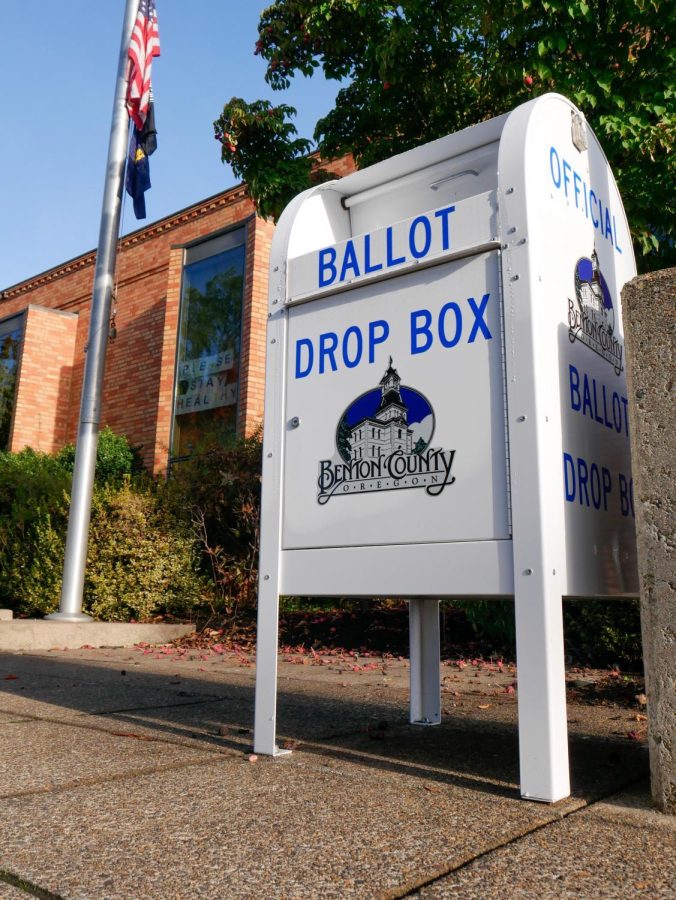Keeping up with the race for governor
November 7, 2022
Neck and neck, they approach the finish line, after months of intense advertising, making speeches, and campaigning throughout the state. Do they seem tired? Exhausted? Burnt out? Not at all. In fact, they’re ready as ever to secure their victory as governor of Oregon.
With Nov. 8 closing in, Oregonians are receiving their ballots and having heartful conversations with their friends, families and colleagues about who the next governor should be. This year is an especially contentious race with reproductive health care, firearm regulation and an already-underway homeless crisis on the line, so you will want to make sure that your vote is one you can be proud of.
Let’s review the candidates:
Tina Kotek is the democratic candidate for governor. According to Kotek’s campaign website, after she graduated from the University of Oregon in 1990, she worked for the Oregon Food Bank and became the policy director for the non-profit Children First for Oregon. Kotek’s website further states that her experience working for non-profits motivated her to serve in the Oregon Legislature, where she was elected Speaker of the House in 2013. The website states that as speaker, she created economic security for many Oregon families, worked to create statewide protection and access to benefits for the LGBTQ+ community, combated climate change and sought to get Oregon safely through the COVID-19 pandemic.
Here are some things Kotek plans to do as soon as she is elected, according to the Oregon Voter Guide and her website:
- Hire 1,000 new street outreach workers to help engage with homeless people and work towards more equitable solutions to Portland’s growing homelessness problem.
- Make Oregon a safe place where people can access reproductive health care, as well as invest in comprehensive, medically-accurate sex education.
- Combat climate change by increasing the use of zero-emission vehicles and promote safe public transit as an accessible choice for Portlanders.
- Increase the age to purchase semi-automatic rifles from 18 to 21 and make efforts to enlist highly trained specialists to respond to individuals suffering from mental health crises.
- Ensure access to services providing physical and mental health care, especially for young individuals after the COVID-19 pandemic.
Christine Drazan is the republican candidate for Governor. According to Drazan’s campaign website, she grew up in Klamath Falls, Ore. in a lower-middle class family, and was driven by experiences from her youth to work in the Oregon Legislature. She worked as director of communications for Mark Simmons, the Republican Speaker of the House in the 1990s, and was elected to the House of Representatives from 2019-2022, representing Oregon’s 39th district. Drazan’s website states that while working in government, she fought for small business rights, opposed gas and energy price rises and voted against higher taxes for Oregonians.
Here are a few things Drazan plans to do as soon as she is elected, according to Oregon Voter Guide and her website:
- Declare a homelessness state of emergency and repeal Measure 110, which decriminalized drugs like methamphetamine and heroin.
- Endorsed by the anti-abortion group Oregon Right to Life, she plans on continuing her work to stop abortions from happening in Oregon at the local level.
- Cut taxes on families and small businesses and fight for job growth in Oregon.
- Veto any bill that compromises second amendment rights.
Betsy Johnson is the non-affiliated candidate for Governor. According to her campaign website, she was raised in Redmond, Ore. to a well-off family. Her father served in the Oregon House, and gave both Johnson and her sister piloting lessons from a young age, which inspired her to help found an aviation company specializing in helicopters. She then continued her career managing the Aeronautics Division of the State Department of Transportation. Afterwards, she served in the Oregon House and Senate for more than 20 years as a fierce advocate for bipartisanship.
A few things Johnson would like to do if she is elected, according to her Oregon Voter Guide and her website:
- Create designated camping areas and emergency shelters with health care, as well as build 580,000 new housing units over 20 years.
- Ensure that Oregon remains a pro-choice state and oppose laws that weaken abortion access and reproductive health care.
- Deal with pressing climate emergencies in a pragmatic way, where the costs don’t fall on blue-collar Oregonians who can’t afford to pay for it.
- Enforce a strong background check system, and ensure that mental health care systems are in place, particularly to bring Oregon up from 50th place for mental health care in the United States.
- Keep “politics” out of the classroom but ensure the personal freedoms of families and communities are protected in educating their children.
This was a quick glimpse at each of the three women running for Oregon governor. To find out more, visit the Oregon Voter Guide. To vote, either mail your signed ballot by sending it in its return envelope, or leave it in an official drop box by 8 p.m. on Nov. 8.

















































































![Newspaper clipping from February 25, 1970 in the Daily Barometer showing an article written by Bob Allen, past Barometer Editor. This article was written to spotlight both the student body’s lack of participation with student government at the time in conjunction with their class representatives response. [It’s important to note ASOSU was not structured identically to today’s standards, likely having a president on behalf of each class work together as one entity as opposed to one president representing all classes.]](https://dailybaro.orangemedianetwork.com/wp-content/uploads/2025/03/Screenshot-2025-03-12-1.00.42-PM-e1741811160853.png)
























